Last Updated on January 25, 2011
.
.
In our recent post A former local’s guide to Antigua, Guatemala, we talked about my return to Antigua since moving away seven years ago. One salient theme of the visit was how much both Antigua and the business owners had, like myself, grown up and matured over the years.
This also goes for our Guatemala gang: the group of us who lived, worked and hung together in Antigua back then. Since 2003, almost everyone has moved on to work in professions which help better the world in some way – from a teacher, a Spanish-speaking therapist and European criminal justice investigator, to a nurse who volunteers her time 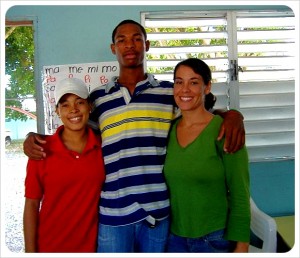 in Mexico. One of the most fun in our circle of friends, Angela Bennett, has just recently founded Community Connection International, a non-governmental organization based in the Dominican Republic. Angie decided to take on this immense challenge after years in the Peace Corps and living, working and traveling in Latin America in order to convert her life experience into practical, helpful methods to help those in need.
in Mexico. One of the most fun in our circle of friends, Angela Bennett, has just recently founded Community Connection International, a non-governmental organization based in the Dominican Republic. Angie decided to take on this immense challenge after years in the Peace Corps and living, working and traveling in Latin America in order to convert her life experience into practical, helpful methods to help those in need.
This interview with Angie tells her story, the challenges and rewards of founding a non-governmental organization, implanting her Service for Aid model of assistance, plus how to volunteer and some excellent tips on traveling the Dominican Republic off the beaten path and on the cheap.
Globetrottergirls: Congratulations on founding Community Connection International! What is the main goal of the organization?
Angela Bennett: Community Connection International’s goal is connect humanity to its potential; in order to do that we all have to step out of our individual worlds and connect 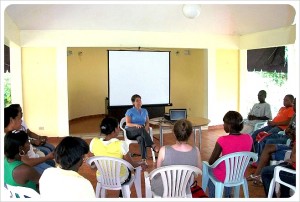 with the greater community. CCI aims to establish community centers in struggling communities, which serve as the location for ‘skill shares’, or places where community and international volunteers share skills to help with community development.
with the greater community. CCI aims to establish community centers in struggling communities, which serve as the location for ‘skill shares’, or places where community and international volunteers share skills to help with community development.
The skill sharing stems from CCI’s programming, which is based on a model Service for Aid. We ask volunteers to share their knowledge with local people, who then teach a skill in return. The pilot community center will open its doors this month in Consuelo, Dominican Republic.
Can you tell a bit about your background? What led you to forming CCI?
I have always had a love for people, travel, and culture. I was raised in Prescott, Arizona, and currently live in Consuelo, Dominican Republic, where I completed my Peace Corps Service from 2004-2006. My academic background includes a Master’s in International Studies with a Certificate in Humanitarian Assistance from the Josef Korbel School of International Studies, and BAs in International Studies and Spanish.
Community Connection International is a dream that I have been piecing together in my mind for about 10 years. I used my Master’s thesis as an opportunity to organize these pieces into a plan for an organization that would implement a new, more effective form of humanitarian aid. This came from witnessing the lack of opportunities of the impoverished.
Can you go back and talk a bit more about Service for Aid? Why have you decided to apply this method in your organization?
During my Peace Corps service, travel, and studies what I consistently saw was a dependent relationship between donors and aid recipients. 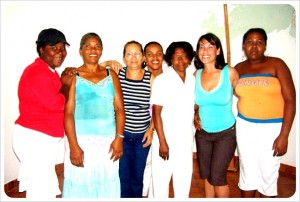 Donors give and recipients receive. I didn’t find any models that broke that cycle, so I created my own: Service for Aid. Service for Aid does seek donations, but it requires that recipients earn the donations as incentives for participation in community service and self-improvement courses. Service for Aid allows those who are economically struggling to earn things they need from local businesses through service-credits earned in service projects and courses organized by CCI. CCI works with local business to create a system of incentives for service-credits earned by participants.
Donors give and recipients receive. I didn’t find any models that broke that cycle, so I created my own: Service for Aid. Service for Aid does seek donations, but it requires that recipients earn the donations as incentives for participation in community service and self-improvement courses. Service for Aid allows those who are economically struggling to earn things they need from local businesses through service-credits earned in service projects and courses organized by CCI. CCI works with local business to create a system of incentives for service-credits earned by participants.
The model requires reciprocity, and can solve short-term needs through incentives in addition to delivering sustainable, long-term impacts like positive community impact and a trained and knowledgeable workforce. By making it an incentive to learn skills and improve both themselves and the community, we hope to empower independence and alleviate the dependency on aid.
What led you to choose the Dominican Republic as the first location for your organization?
There are two main reasons: First, I served in the Peace Corps in the Dominican Republic, as did my friend and CCI team member Alexis Loerke. We both have great working relationships with the community, which is essential for the success of an international program.
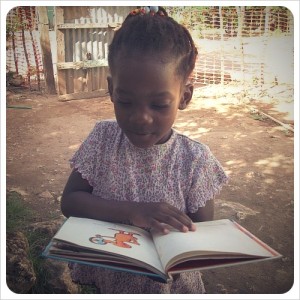 Second, the town of Consuelo is suffering from over 90% unemployment due to the recent closing of the local sugar mill. They desperately need the short-term incentives the Service for Aid model can provide, as well as the long-term impacts. Also, community members themselves admit they have fallen into a state of dependence. When the booming publicly owned sugar mill was privatized in the 1990s, poverty sharply increased, causing charity organizations, local politicians, and emigrated relatives to supplement resources for members of the community. Over a decade later, the community now needs to develop skills to find (and create) employment in new markets in order to be economically stable and independent.
Second, the town of Consuelo is suffering from over 90% unemployment due to the recent closing of the local sugar mill. They desperately need the short-term incentives the Service for Aid model can provide, as well as the long-term impacts. Also, community members themselves admit they have fallen into a state of dependence. When the booming publicly owned sugar mill was privatized in the 1990s, poverty sharply increased, causing charity organizations, local politicians, and emigrated relatives to supplement resources for members of the community. Over a decade later, the community now needs to develop skills to find (and create) employment in new markets in order to be economically stable and independent.
Starting an NGO can’t be easy – what were some of the difficulties of getting started, and how have you overcome them?
Trying to wear the various hats of founder, director, project manager, fundraiser, receptionist, translator, and event coordinator, among others, has been a challenge. Luckily, I have been blessed to have some great people step up and volunteer their time to help out. For example, a friend I worked with in Tucson six years ago, Rachel Lohrman, after reading the first newsletter, said she wanted to be involved. She designed our amazing website and has worked tirelessly to help get things off the ground. I am also grateful to my family for their unconditional support.
The people of Consuelo have taken me in and treat me like family. Their vigor for life, energy and optimism, despite such hard conditions, motivates me to keep pushing forward.
Does CCI need volunteers? In what ways can people help CCI, where would volunteers be based and what would they be doing?
CCI is set up to include anyone who wants to participate. Whether you realize you have a skill to share or not, you can help the community with CCI. Even skills you may consider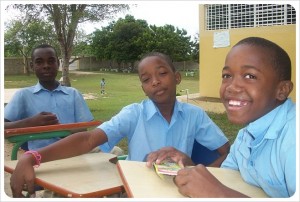 simple like multiplication or pregnancy prevention can be taught to CCI members. Share what you are interested in, passionate about, and the local CCI members will do the same in return.
simple like multiplication or pregnancy prevention can be taught to CCI members. Share what you are interested in, passionate about, and the local CCI members will do the same in return.
You can volunteer for a month or longer, a day or shorter, or even skill share via Skype. We encourage you to get involved in any way you can! For those who can’t come to volunteer in the Dominican Republic, financial support is of course always needed and appreciated. Donations can be made at our website www.cciinfo.org.
Can you give our readers a few tips on off-the-beaten-path Dominican Republic, accessible for budget travelers?
My pleasure! The Dominican Republic is dominated by large all-inclusive resorts, but that doesn’t mean there aren’t great places to explore; there are tons! I will list some of my favorites, but before I do, as a traveler of Latin America myself, I have to say that Dominicans are quite possibly the friendliest and liveliest Latin population I’ve met. The entire island is beautiful and accessible by bus. Beyond buses (called guaguas), the most common form of urban transportation is the moto-concho, or moto-taxi. These forms of transportation can take you to some these amazing places:
In the east, where I live, you’ll find San Pedro de Macorís, Juan Dolio, la Romana, Bayahibe, Higuey, Bavaro, Punta Cana. Juan Dolio, Bayahibe, Bavaro, and Punta Cana are your beach towns. You can find reasonable deals at resorts with drinks and food included, or more reasonable guest house rooms which force you to get out and explore. The beaches are definitely cleaner by the resorts. I like Juan Dolio and Bayahibe as opposed to Bavaro and Punta Cana, which draw the biggest international crowds.
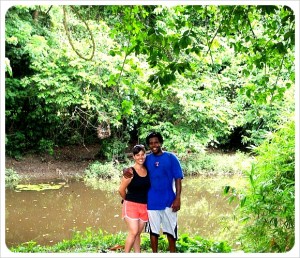 In the southwest, you’ll find the famous and beautiful Bahia de la Aguilas (Bay of Eagles), and on your way there the coast highway is dotted by affordable hotels that sit right on the water. It is beautiful! Be sure to take pictures of the stunning views in Paraiso.
In the southwest, you’ll find the famous and beautiful Bahia de la Aguilas (Bay of Eagles), and on your way there the coast highway is dotted by affordable hotels that sit right on the water. It is beautiful! Be sure to take pictures of the stunning views in Paraiso.
The north, known as El Cibao, you will find great beach towns like Puerto Plata, Sosua, and Cabarete. Cabarete has been the best at serving the backpacker community. It has a fun variety of restaurants, stores, and nightlife. On your way north be sure to stop at the 27 Waterfalls near Imbert. Trained guides help you climb the 27 falls and the bravest jump down all of them. The less brave weaker, like me, jump some and climb down some.
The big cities: Santo Domingo and Santiago have the pros and cons of any metropolis, museums, restaurants, nightlife, parks coupled with increased risks, traffic, and higher prices. In Santo Domingo, the Colonial Zone is a favorite. El Conde is a pedestrian walkway through the heart of the Colonial Zone, where you can find shops, restaurants, and tour the earliest New World sites.
If you do travel to the Dominican Republic, please come visit CCI in Consuelo, just north of San Pedro de Macorís. I also recommend you get chummy with the locals. Take a seat at a local colmado (general store) and buy a beer. Here beers are sold in liters and come with small plastic cups to share with friends. Share with your new friends and jump into a lively game of dominoes. You’ll be a pueblo favorite in no time!
Sounds amazing! Final question – how can people get in touch to donate their time or financially to Community Connection International?
Visit our website for more information or donations: www.cciinfo.org, check out the CCI Blog or follow CCI on Facebook. Please feel free to contact me regarding volunteering, donating, travel, or anything else at [email protected]
I hope to see the Globetrottergirls here on the island soon!





Meghan
Friday 28th of January 2011
Great article! Well-written, concise, informative. Great organization too, Bennett!!
jess
Friday 28th of January 2011
Thanks Meghan! We'd be happy if this interview helps to point some volunteers towards CCI. It's amazing what Angela has achieved so far, she is doing a fantastic job.